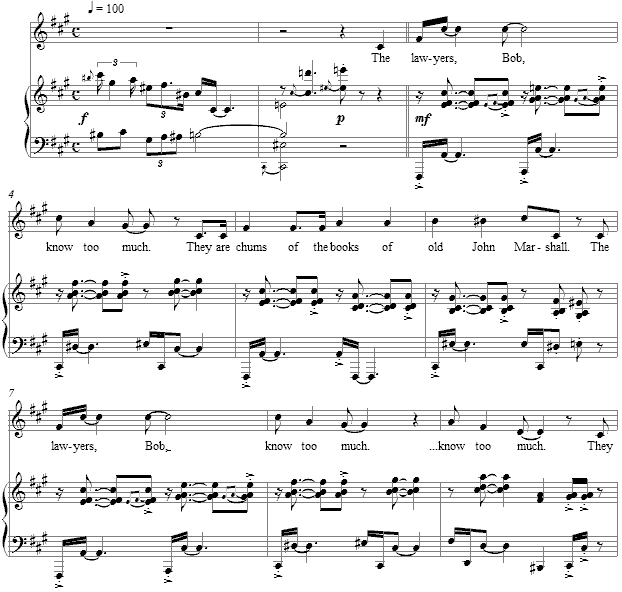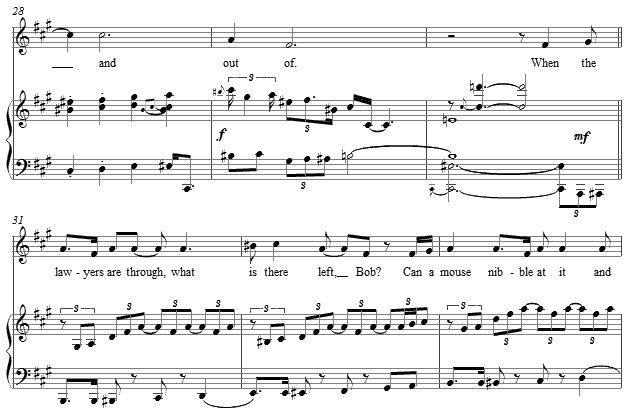Music and Texts of GARY BACHLUND
Vocal Music | Piano | Organ | Chamber Music | Orchestral | Articles and Commentary | Poems and Stories | Miscellany | FAQs
The Lawyers Know Too Much - (2008)
Carl Sandburg
for medium voice and piano
for Otto and Margaret Reichardt
The lawyers, Bob, know too much.
They are chums of the books of old John Marshall. [ 1 ]
They know it all, what a dead hand Wrote,
A stiff dead hand and its knuckles crumbling,
The bones of the fingers a thin white ash.
The lawyers know
a dead man’s thoughts too well.
In the heels of the higgling lawyers, Bob, [ 2 ]
Too many slippery ifs and buts and howevers,
Too much hereinbefore provided whereas,
Too many doors to go in and out of.
When the lawyers are through
What is there left, Bob?
Can a mouse nibble at it
And find enough to fasten a tooth in?
Why is there always a secret singing
When a lawyer cashes in?
Why does a hearse horse snicker
Hauling a lawyer away?
The work of a bricklayer goes to the blue.
The knack of a mason outlasts a moon.
The hands of a plasterer hold a room together.
The land of a farmer wishes him back again.
Singers of songs and dreamers of plays
Build a house no wind blows over.
The lawyers—tell me why a hearse horse snickers
hauling a lawyer’s bones.[ 6 pages, circa 3' 00" ]
Carl Sandburg
The lawyer has been held up to ridicule seemingly from time immemorial. William Shakespeare gave us this now legendary phrase, as Butcher says to Jack Cade, "The first thing we do, let's kill all the lawyers." (2 Henry VI, 4.2.59) Sandburg's contemporary, Robert Frost, suggested, "A jury consists of twelve persons chosen to decide who has the better lawyer." This is of course what litigation often does, deciding for the story of the more convincing storyteller. So, Sandburg has his erudite fun with lawyers, linking them especially to the United States' federal system in the person of one of its historical exemplars, John Marshall.
Written for a medium range, the verse form begins with a syncopated introduction, and then the familiar "Scotch snap" to crisply and aggressively capture the word, "lawyers." The second verse is musically a truncation of the first set of gestures, as is the final recapitulation. We may understand that Sandburg's notion that they "know too much" refers to the misuse of such knowledge and power, for in every legal battle there must be a loser. As an attorney with whom I once shared an office observed, "Law is litigation between opposing parties, and therefore is statistically wrong half the time."
The bridge in this song form breaks into triplets in the duple meter, mimicking a "swing time" tempo and feel, as the subdominant breaks the square tonic feel which precedes the bridge.
The score for The Lawyers Know Too Much is available as a free PDF download, though any major commercial performance or recording of the work is prohibited without prior arrangement with the composer. Click on the graphic below for this piano-vocal score.
NOTES
[ 1 ] John Marshall (1755-1835) was from the Commonwealth of Virginia and was a leader of the Federalist Party who became both a famed statesman and jurist who
shaped American constitutional law, making the Supreme Court a more formidable center of power than it earlier had been. He served in the United States House of Representatives from 1799 to 1800, and served as John Adams' Secretary of State from 1800 to 1801. Marshall then became Chief Justice of the United States Supreme Court, serving from 1801 until his death in 1835. As the longest serving Chief Justice in Supreme Court history, he established that the courts are entitled to exercise judicial review, the power to strike down laws that violate the Constitution. Thus, Marshall has been credited with cementing the position of the judiciary as an independent and influential branch of government. Furthermore, Marshall made several important decisions relating to Federalism, shaping the balance of power between the federal government and the states during the early years of the republic. In particular, he repeatedly confirmed the supremacy of federal law over state law and supported an expansive reading of the enumerated powers.
[ 2 ] "Higgling" is another form of haggling, certainly what lawyers and especially the lawyer-politicians do. American humorists have especially enjoyed a laugh because of the lawyer. Ambrose Bierce in his Devils Dictionary defines a lawyer as "One skilled in circumvention of the law," and Will Rogers said, "Make crime pay. Become a Lawyer." Certainly the "higgling" of the political class -- most of them lawyers -- makes elections often fiery and therefore entertaining, if not exasperating, races.


